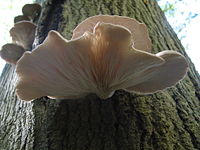
Photo from wikipedia
The relationship between sludge organic fraction and its dewaterability is well known in practice. However, the formal study to reveal the underlying reason is limited. To improve understanding of the… Click to show full abstract
The relationship between sludge organic fraction and its dewaterability is well known in practice. However, the formal study to reveal the underlying reason is limited. To improve understanding of the nature of organic content on sludge dewatering process, this study systematically evaluated the effects of sludge organic content on its dewaterability and revealed the underlying mechanism. Analysis of 10 waste activated sludge (WAS) samples with varying organic contents showed that capillary suction time (CST) increased linearly from 34.90 ± 0.10 s to 104.90 ± 0.30 s (R2 = 0.92, p < 0.01), whereas the solid content of centrifuge cake decreased from 21.23 %±0.45 % to 12.52 %±0.14 % (R2 = 0.89, p < 0.01) when organic fractionincreased from 35.72 % to 61.11 %. These results first confirmed that WAS dewatering performance was negatively correlated to its organic content. Then, the underlying mechanism was revealed by studying the basic physicochemical properties of WAS with various organic content. The results showed that sludge with a higher organic content generally had greater extracellular polymeric substances (EPS) content, lower density and higher negative zeta potential, which hinder the aggregation and flocculation of floc particles. These properties endow the WAS with a higher organic content generally possessed more bound water content, small pores, poorer fluidity, and stronger network strength. These characteristics can hamper the separation of water from sludge cake during dewatering. Based on which, this study discussed the potential of organic fraction as a surrogate of EPS for evaluating WAS dewaterability and indicated the organic fraction can be a useful and strong indicator of WAS dewaterability.
Journal Title: Journal of hazardous materials
Year Published: 2020
Link to full text (if available)
Share on Social Media: Sign Up to like & get
recommendations!